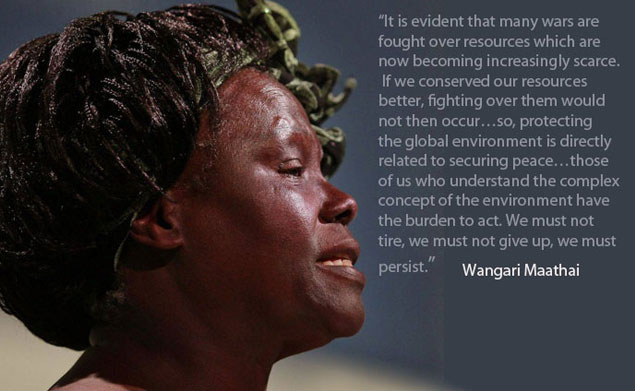
If Kenya had a mother, Professor Wangari Maathai is the true mama Kenya; she fought for and served her children with courage. As the first woman in East and Central Africa to get a doctorate and the first African woman to win the Nobel peace prize, Wangari inspired many beyond the Kenyan borders. She was indeed a pride of Africa.
As a girl child growing up in Kenya, I watched Wangari literally fight for what she believed in: better governance, environment protection and empowering women at the local level to participate in decision making. I watched instances when she was chased, dragged in the streets and arrested by the police for demonstrating against injustice in Kenya. I watched her proclaim “if we are going to shed blood because of our land we will” and often wondered why a woman with her credentials chose to risk her life for the public good. I mean, she could have easily taken up a job as a professor in any university and would have lived a comfortable life but she chose to stand with the voiceless.
With time, I began to understand why she did what she did and began drawing inspiration from her. As an African feminist, I especially shared her view that one’s ability to make decisions should not be determined by their gender; to Wangari, the only anatomy that mattered was what was above the shoulders- meaning our brains and how we reason. She went against the “African tradition” and did what women were not allowed to do by standing up against the government. Former president Moi referred to her actions as “disrespect of men” and her husband divorced her saying she had become too radical. When I met Wangari in 2007 during election debate in Nyeri, all I saw was a humble yet undeterred woman leader.
She inspired me so much, that today I strive to keep her vision alive. Wangari’s belief was that “It is the people who must save the environment. It is the people who must make their leaders change. And we cannot be intimidated. So we must stand up for what we believe in.”
In promoting this vision, I urge my fellow Africans to stand up against the injustices we see in our communities. You do not have to plant a million trees to save the environment, plant one and inspire a friend or a colleague to do the same. Let planting a tree be a symbol of caring for one another, this could mean: sponsoring a child in your village to go to school, exposing a corrupt leader, fundraising for a community borehole, speaking up against human rights violators, sharing information and knowledge with others, respecting a neighbor regardless of his/ her ethnicity, voting for a leader based on his capabilities, suggesting ways to mitigate the impacts of urban development among other noble deeds.
Always know there is no good that goes to waste no matter how small. We must therefore stand up for what we believe in and use our passions and capabilities for the greater good. May Professor Wangari Rest In Peace.



Author: Sheila Muthemba is a recent graduate of Master of public administration (MPA) and International Relations (MAIR) from the Maxwell School of Citizenship and Public Affairs. Her research focus areas include women, leadership, and peace and development issues.

Latest posts by cadmin (see all)
- The Story of a Ghetto Boy - June 28, 2015
- The Rise of The Next Gen. Marley’s | Bob Marley’s grandsons (VIDEO) - May 8, 2015
- Meanwhile somewhere in Sweden, these Swedish African dancers… - March 24, 2015








